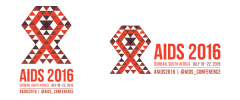AIDS 2016 In Durban: Shame And Revolt! Hope Also...
South Africa is a symbolic country in the fight against AIDS. A country has two faces. One of shame and ignorance. One of rebellion.
The face of shame and ignorance is the one of President Thabo Mbeki and his health minister Manto Tshabalala-Msimang, who denied any link between HIV and AIDS, delaying as much as possible arrival of HIV treatment for south African patients, trying out their efficiency of a garlic based treatment of olive oil and lemon. Together, these two state characters are responsible for over 300,000 deaths... Stephen Lewis, UN Special Envoy for HIV / AIDS, has not hesitated to call it a few weeks ago the action of the former president of crimes against humanity. And we can only agree! Today, South Africa is the country in the world that has the largest number of people living with HIV: 19% of the adult population is HIV positive. And the former president still continues in his soft, deadly drift to deny any link between HIV and AIDS... Perhaps more than in any other country, the Act Up slogan will find a dramatic reality: “Ignorance is your enemy.”

This face of the revolt is embodied by the Treatment Action Campaign (TAC) that succeeds in engaging force and scientific evidence, to bend the South African government and to get it out of its blindness. This face is also that of Edwin Cameron, Justice of the Constitutional Court, white, gay and who publicly revealed his HIV status in 1999, a huge personality in South Africa that has never lowered our guard in the fight against AIDS, a personality I had the chance to meet. This face is also that of Nelson Mandela, who is engaged in this struggle.
No doubt the revelation that he wished to do of the HIV condition of his son after his death has broken a wall of silence and allowed to make a leap forward in the visibility of people with HIV and the question of their rights.
In 2000, I was present at the International AIDS Conference in Durban and I am coming back 16 years later. In 16 years, enormous progress has been made in the fight against AIDS and the Millennium Development achieved. Yet few were betting on this achievement! New HIV infections have fallen by 35% and deaths by 41%. For 16 years, 30 million new HIV infections and nearly 8 million AIDS-related deaths have been avoided.
Today, we know how to end AIDS. This requires access to screening more than half of HIV-positive people in the world who do not know their HIV condition. This requires sustainable access to treatment: Today, 17 million HIV-positive people — and 4,000 people still die every day — have no access to antiretroviral medication (ARV), while the World Health Organization (WHO) recommended starting treatment of all HIV positive people regardless of their immunity because of both individual and collective benefits of early access to treatment.
This implies a much more developed access and political awareness to expand prevention tools, the first of which PrEP. In 2020, it is essential to achieve the goals set by UNAIDS : 90% of all people living with HIV will know their HIV status. By 2020, 90% of all people with diagnosed HIV infection will receive sustained antiretroviral therapy. By 2020, 90% of all people receiving antiretroviral therapy will have viral suppression. It also requires a real policy to promote human rights and abolition of discriminatory laws against drug users, LGBT people, sex workers.
These questions will be at the heart of the 21st International Conference of fight against AIDS. I’ll be there as a community activist. As an ambassador “For an Ile-de-France Region without AIDS.” As a person who has been living with HIV for the past 30 years ...